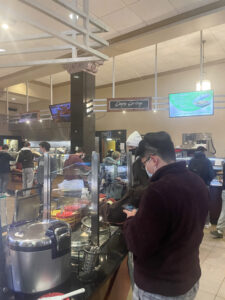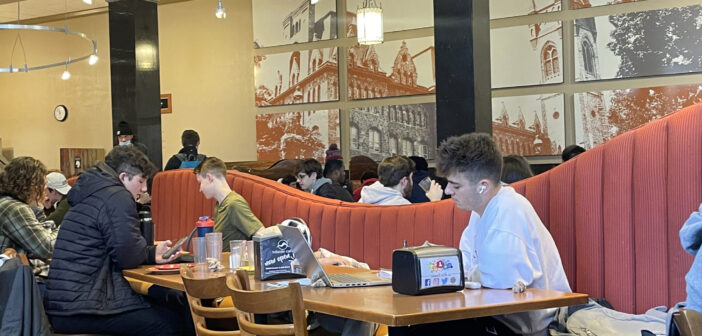Like all new students, Philip Ho, ‘25, quickly fell victim to the never ending stairs on Lehigh’s campus. Living in Drinker House, going to and from his room to the dining halls became a dreaded chore for Ho.
This inconvenience caused by Lehigh’s mountainous campus, coupled with Ho’s desire to get Hawk’s Nest delivered to his late-night three-hour lab, inspired him to create the Donkee app, a dining hall food delivery app for Lehigh students.
“It was during the summer, and we had to go up and down the stairs – that was absolutely terrible,” Ho said. “Every time I would go up the stairs, my shirt would be drenched in sweat, and I just thought, I don’t want to do this for the rest of the year.”
Ho and his team of peers, including co-founders Muzammil Jawed, ‘25, and Jake Murphy, ‘25, and app-developer Ethan Lavi, ‘25, joined together to create an app to have Lehigh students delivering food to fellow students.
The team is launching its Beta program on Feb. 27.
Ho said Donkee will launch for the first 100 users, allowing them to order food from Hawk’s Nest and Upper Court for a flat $2.99 delivery fee, using credit card, debit card or Venmo.
Ho said students can join the waitlist for early access to the app on their website. Additionally, the first 100 people to sign up get access to Donkee’s own “Donkee Coin” cryptocurrency, developed by the team.
Depending on the success of the launch, Ho said access to delivery from other dining halls, as well as a few off-campus restaurants, will be available within a few weeks.
He said they hope to add payment options through GoldPlus and Meal Swipes in the future.
In the early stages of their planning, the team pitched their idea through the Eureka! Venture Program at the Baker Institute to gain both funding and mentorship for their newly-born startup.
Eureka! is a program where students with an entrepreneurial mission can explore and pursue their ideas and business ventures.
Ho said the company took two to three months of market validation experiments to test both the supply of students willing to deliver food, as well as the demand of students to order food using the delivery service.
To test the supply component, Ho stood outside Upper Court with a box of cookies and a question for students.
“I asked every person who walked out of the UC whether they wanted to deliver a cookie to my friend in the library for $2,” Ho said. “Around 67 percent of the students accepted.”

Students enjoy a meal in Lower Court at the University Center. Lower Court serves buffet-style meals and is open Monday through Friday. (Xilong Liu/B&W staff)
Ho said after conducting the experiment, they had a five-minute average delivery time with a completion rate of 90 percent.
Chris Kauzmann, innovator-in-residence at the Baker Institute for Entrepreneurship, was one of the first people to hear about the project.
Ho said Kauzmann became a close mentor to the group as they furthered their success at Eureka! Pitch nights. The team earned two $100 prizes and a $1,000 award to help fund the development of the app.
Kauzmann described the group as unique. He was impressed with their preparedness, willingness to be coached and their successful execution of ideas.
Kauzmann further said the team did a great job of identifying their problem and mission and then translating that information into mockups and prototypes.
Though Kauzmann said he is hopeful for the future of the Donkee app, he was mainly excited for Ho’s development as an entrepreneur.
“(Donkee) might be a ‘kind of’ success, maybe a few people use it, or could be a complete and utter failure and never get off the ground,” Kauzmann said. “That doesn’t matter to me as much as Philip’s experience that he’s getting as a first year student and what he’s going to be able to do by the time he’s a senior or by the time he’s 30.”
Fellow Lehigh students were also intrigued by the group’s success at Eureka!
Declan Coster, ‘23, said he thinks the team is doing a wonderful job considering how rare it is to have first years pitch, let alone get to the final stages of Eureka!
“I’m really excited to see how Donkee turns out,” Coster said. “I think it will be well received because while there’s monetary value added into different aspects of it, at the end of the day it is going to make most people’s lives a little bit easier. ”
In addition to benefiting the students making deliveries by paying them a portion of the profits, Donkee will also be engaging in philanthropic efforts.
Ho said the team will be donating 20 to 40 percent of their profits to Peaceful Valley Donkey Rescue and Brooke, two charities working to improve the lives of working donkeys in Southeast Asia and prevent donkey skin trading.
“Building something with your friends that will somehow change the world you live in – it’s exciting,” Ho said. “I hope that besides helping donkeys and improving the lives of donkeys, we have fun. It’s really that simple. I just wish to have fun with my friends.”






Comment policy
Comments posted to The Brown and White website are reviewed by a moderator before being approved. Incendiary speech or harassing language, including comments targeted at individuals, may be deemed unacceptable and not published. Spam and other soliciting will also be declined.
The Brown and White also reserves the right to not publish entirely anonymous comments.
2 Comments
Apparently despite the high cost of a Lehigh education some have adequate disposable income.
One reason the University was constructed here was so its students would be physically fit through normal activities. The heavy doors in the buildings accentuated the effect.
This is a great example of someone identifying a problem and deciding to address it with the help of technology. Universities can really be a great place for nurturing this sort of thing. Even if it doesn’t seem particularly “ground-breaking”, if there’s demand for an app and it’s executed properly- it can be successful!